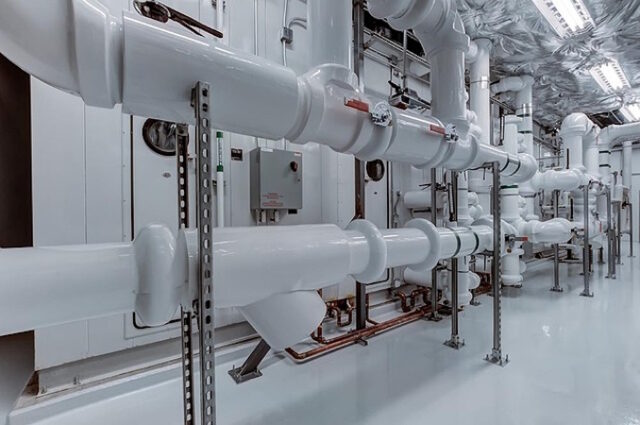
In the world of commercial plumbing, where every minute counts (and every drop matters), efficiency and reliability mean everything. From office buildings to restaurants, hospitals to hotels, the demand for functional plumbing systems is constant and non-negotiable.
Fortunately, technological advancements have revolutionized the industry, offering innovative solutions to streamline operations and enhance performance.
Read more about how technology is reshaping commercial plumbing, paving the way for Improved efficiency and reliability.
IoT (Internet of Things) Devices and Commercial Plumbing
A significant advancement in commercial plumbing technology is the emergence of smart systems and IoT (Internet of Things) devices. They provide real-time monitoring and control, allowing plumbers to remotely access and manage plumbing systems. These systems can detect leaks, monitor water pressure, and even analyze usage patterns to identify potential issues before they escalate into costly problems.
On top of that, IoT-enabled valves and pumps can be remotely controlled and optimized for maximum efficiency. By adjusting flow rates and pressure levels based on demand, these systems ensure that water is distributed precisely where and when it’s needed, minimizing waste and energy consumption.
Leak Detection and Prevention
Leaks in commercial plumbing systems can lead to significant water wastage, property damage, and financial losses. Traditional methods of leak detection often involve manual inspections, which can be time-consuming and unreliable. However, with the advent of technology, leak detection has become more efficient and accurate.
Smart leak detection systems utilize sensors and algorithms to continuously monitor water flow and detect abnormalities indicative of leaks. These systems can pinpoint the exact location of a leak, allowing for prompt repairs before it escalates into a costly problem. By proactively identifying and addressing leaks, businesses can minimize water wastage and mitigate potential damage to their infrastructure.
Enhanced Pipe Inspection and Maintenance
Another area where technology is making a significant impact is in pipe inspection and maintenance. Traditional methods of inspecting pipes often involve invasive procedures that can disrupt operations and cause inconvenience to occupants. However, with advancements such as robotic cameras and digital imaging, plumbers can now conduct comprehensive inspections with minimal disruption.
Robotic cameras equipped with high-definition imaging capabilities can navigate through pipes of all sizes, capturing detailed footage of the interior condition. This allows plumbers to identify potential issues such as corrosion, blockages, or leaks without the need for excavation or dismantling of the plumbing system. By pinpointing problems accurately, technicians can devise targeted repair strategies, saving time and resources in the process.
Water Conservation and Efficiency
With growing concerns about water scarcity and environmental sustainability, businesses are under increasing pressure to minimize their water footprint. Technology plays a crucial role in enabling businesses to achieve greater water conservation and efficiency in their plumbing systems.
Advanced plumbing fixtures equipped with sensor-based controls and low-flow technology help reduce water consumption without sacrificing performance. Additionally, smart irrigation systems utilize weather data and soil moisture sensors to deliver the right amount of water precisely where and when it’s needed, minimizing waste and promoting healthy landscapes. By embracing these technologies, businesses can not only reduce their environmental impact but also realize significant cost savings through lower water bills.
Predictive Maintenance
Unplanned downtime due to equipment failures can disrupt business operations and incur substantial losses. Predictive maintenance leveraging technology offers a proactive solution to minimize such disruptions in commercial plumbing systems.
By harnessing data analytics and machine learning algorithms, predictive maintenance systems can analyze historical performance data to identify patterns and predict potential equipment failures before they occur. This allows for scheduled maintenance activities to be planned in advance, minimizing downtime and maximizing the lifespan of plumbing infrastructure. Ultimately, predictive maintenance helps businesses optimize their maintenance schedules, improve system reliability, and reduce operational costs.
Technology is Transforming Commercial Plumbing
Technology is driving improvements throughout the world of commercial plumbing, making the industry more efficient, reliable, and sustainable. By embracing innovative solutions such as smart leak detection, remote monitoring, water conservation technologies, and predictive maintenance, businesses can optimize their plumbing systems, reduce operational costs, and enhance their environmental stewardship.
As technology continues to evolve, the future of commercial plumbing promises even greater advancements, empowering businesses to thrive in an increasingly connected and efficient world.












